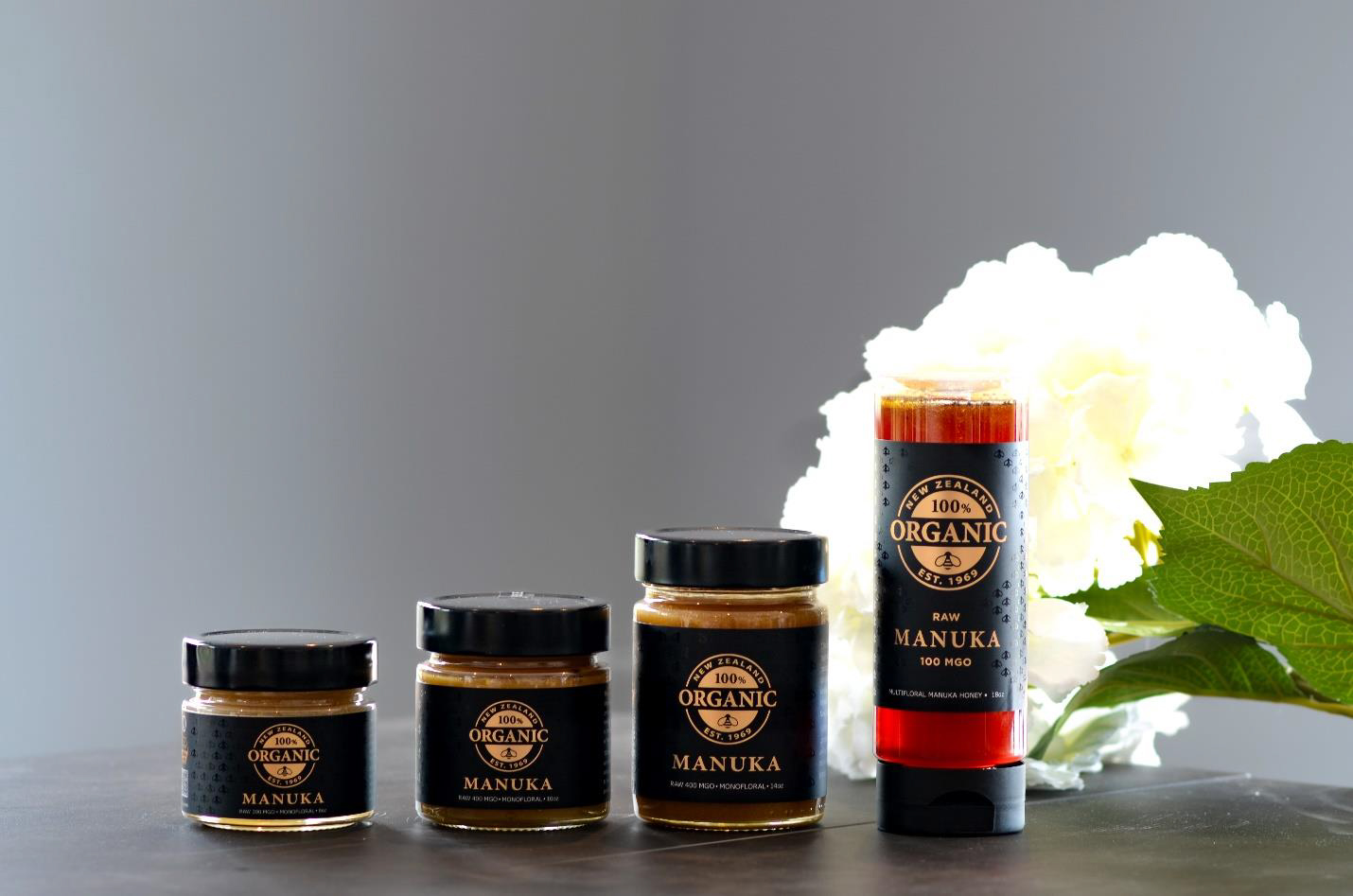Introduction
New Zealand is renowned for its pristine landscapes and diverse flora, which contribute to the production of some of the world's finest honeys. At Bee-Licious Honey, we are excited to offer a premium selection of Spring Bank Organic Honeys. In this blog, we'll explore the unique qualities of New Zealand honeys, the different varieties we offer, and why you should choose Spring Bank Organic for your honey needs.
Unique Qualities of New Zealand Honeys
New Zealand’s unique climate and rich biodiversity create the perfect environment for producing high-quality honey. The country’s commitment to sustainable and ethical beekeeping practices ensures that each jar of honey is not only delicious but also environmentally friendly.
Types of New Zealand Honeys Offered
1. Manuka Honey

Manuka honey is celebrated worldwide for its unique properties and health benefits. The key to its potency lies in Methylglyoxal (MGO), a compound found in high concentrations in Manuka honey.
What is Methylglyoxal (MGO)? Methylglyoxal (MGO) is a naturally occurring compound found in Manuka honey. It is derived from dihydroxyacetone (DHA), which is present in the nectar of Manuka flowers. The concentration of MGO in Manuka honey is a key indicator of its potency and antibacterial properties. Higher MGO ratings indicate stronger antibacterial activity.
Health Benefits of MGO:
- Antibacterial Properties: MGO has been shown to have strong antibacterial effects, making Manuka honey effective in wound care and infection prevention.
- Digestive Health: Manuka honey with high MGO levels can help soothe digestive issues and support gut health.
- Immune Support: Regular consumption of Manuka honey can enhance immune function due to its antibacterial and anti-inflammatory properties.
Benefits of Manuka Honey:
- High in Antioxidants: Research suggests Manuka honey may help protect against oxidative stress and aid in wound healing.
- Antimicrobial: Manuka honey’s antibacterial activity may be useful in boosting the immune system and (when used topically) fighting infections such as diabetic ulcers.
- Energy Boosting: Honey is high in carbohydrates, a source of energy.
We offer Spring Bank Organic's Manuka honey in three MGO ratings: 100, 400, and 600, each with its own distinct benefits.
- 100 MGO Manuka Honey: Perfect for everyday use, offering mild antibacterial properties.
- 400 MGO Manuka Honey: Provides enhanced health benefits, ideal for boosting immunity.
- 600 MGO Manuka Honey: Highly potent, used for medicinal purposes and advanced health support.
Flavor Profile: Rich, earthy flavor with slightly bitter undertones. Specific Uses:
- 100 MGO: Daily sweetener, skincare, soothing sore throats.
- 400 MGO: Immune support, digestive health, wound care.
- 600 MGO: Healing cuts and burns, advanced antibacterial applications.
For more information on the uses of Manuka honey, check out WebMD’s article on Manuka honey benefits.
FAQs About Manuka Honey:
Where does Manuka honey come from? Manuka honey comes from the nectar of the Manuka bush (Leptospermum scoparium), a shrub native to New Zealand and Australia. The Manuka bush, also known as the tea tree, grows in coastal areas of New Zealand and other places, including the Chatham Islands, New South Wales, Tasmania, and Victoria. Bees pollinate the Manuka bush's flowers to produce honey.
Why is Manuka honey so expensive? Manuka honey is often more expensive than other types of honey. Its exclusivity, geographical limitations, and antibacterial properties contribute to its high price. For Manuka honey to be considered monofloral, the bees that create it must get the majority of their nectar from Manuka trees. This raises several challenges. First, the flowering season only occurs for about 6 to 12 weeks across all of New Zealand or about 4 to 6 weeks in any particular location, so there’s only a short window for bees to get the right nectar for Manuka honey. If it’s rainy or windy during the flowering season, bees may reduce their time spent foraging and Manuka flowers may get damaged. The stringent UMF grading system and the myriad of health benefits further justify its premium price tag.
Does hot tea destroy Manuka honey? Like with any biological compound, high sustained heat can destroy the methylglyoxal that is associated with antibacterial activity in Manuka honey. Yes heat definitely does destroy MGO but it is heat PLUS time. For the amount of time that you would have honey in your tea and drink it, is notgoing to affect the MGO to the point of destroying it. It is still going to be really good for you to consume Manuka Honey in your hot beverage
Environmental Benefits of Manuka Plants Not only do Manuka products contain properties that may be beneficial to our health, but Manuka is also helpful for the environment. Manuka shrubs provide benefits, including reducing erosion, improving the condition of streams, and fostering biodiversity.
Some of the ways Manuka plants boost the health of streams are by providing shade for other plants to grow and by establishing roots near banks, which reduces erosion. This nurtures biodiversity because the Manuka bushes attract birds, insects, and livestock.
Manuka seedlings are also an important part of the forest regeneration process since they’re often some of the first plants to grow after a fire. They can survive in harsh conditions and help establish a suitable environment for other plant species to take over.

2. Clover Honey
New Zealand clover honey is known for its light, mild flavor and smooth texture. It’s incredibly versatile, making it perfect for sweetening teas, baking, and drizzling over your favorite foods.
Flavor Profile: Delicate, sweet, and floral with a smooth finish. Specific Uses:
- Sweetening beverages like tea and lemonade.
- Baking, especially in light cakes and pastries.
- Drizzling over yogurt, oatmeal, and fresh fruit.
3. Honeydew Honey
Unlike traditional honey, honeydew honey is produced from the nectar of aphids and other insects feeding on trees. This process results in a dark, rich honey with a distinctive flavor profile and numerous health benefits.
Flavor Profile: Bold, malty, and slightly tangy with a rich texture. Specific Uses:
- Adding depth to sauces and marinades.
- Pairing with strong cheeses.
- Using it as a spread on toast or pancakes.
3. Spring Bank Organic Honey
Spring Bank Organic is a family-owned business dedicated to producing high-quality, certified organic honey. Their commitment to organic practices means no pesticides or chemicals are used, ensuring that their honey is pure and natural. Note that while their Manuka honey is certified organic, the clover and honeydew honeys are not.
- Family-Owned Trust: Spring Bank's family-owned nature ensures a high level of care and trust in their beekeeping practices.
- Certified Organic: Their organic certification guarantees that you are getting honey that is free from harmful additives and chemicals.
Sustainability and Ethical Beekeeping
Spring Bank is committed to sustainability and ethical beekeeping. Their initiatives help protect bee populations and ensure the health of our planet. By choosing Spring Bank Organic Honeys, you support these important efforts and enjoy honey that is produced with the utmost respect for the environment.
Why Choose Spring Bank Organic Honeys?
When you choose Spring Bank Organic Honeys, you’re choosing quality and purity. Each jar is rigorously tested to ensure it meets the highest standards. Whether you’re looking for the healthbenefits of Manuka honey or the delicious taste of clover and honeydew honey, Spring Bank has something for everyone.
Conclusion
New Zealand honeys are truly special, offering unique flavors and health benefits. Spring Bank Organic Honeys stand out for their commitment to quality, sustainability, and ethical practices. We invite you to experience the exceptional taste and benefits of these honeys for yourself.

Discover our full range of Spring Bank Organic Honeys and bring the taste of New Zealand to your home.

